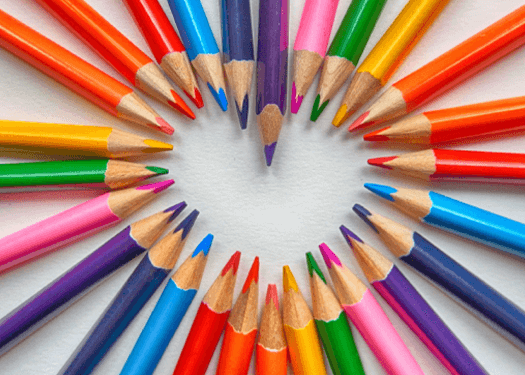
How Art Benefits Mental Health
There is extensive research that proves that art benefits mental health. Neuroesthetics is the scientific study of the neurobiological basis of the arts. Scientific evidence of how people respond to the arts is gathered through brain imaging, brain wave technology, and biofeedback.
A study published in BMC Public Health in 2020 found that participation in art programs may increase life satisfaction and promote positive mental health. The Cleveland Clinic explained in a 2020 article about the benefits of using creativity for stress relief during the pandemic, noting how art provides a way to visually express feelings when verbal expression may be too difficult. A study published in 2016 in the Journal of the American Art Therapy Association found that making art resulted in a statistically significant reduction in the stress hormone, cortisol. Art can also be beneficial for specific conditions, such as patients with dementia or PTSD.
Art allows you to build a capacity for managing your mental health and well-being by helping you to:
Develop Creativity
Art helps develop creativity. Art enables you to express what you are feeling in a visual way that is often easier than using words. The more you stretch your brain with creative and flexible tasks like art, the easier it will be for you for to apply these skills in everyday life. Creative thinking can help you find new ways to solve problems and maybe even be less impulsive in your decision making.
Reduce Isolation
When you participate in an arts workshop, you are interacting with a community and building your social support.
Boost Confidence and Self-Esteem
When you feel more accepting of yourself, it will impact your attitude in everything you do. You will also feel proud of yourself for taking the time to make art, regardless of how the finished product turns out.
Increase Empathy
Studies show that simply looking at art causes you to experience an increase in empathy and happiness.
Increase Relaxation
When you focus on creating art, your mind will naturally relax. You have probably already observed this relaxing effect when coloring, seeing first-hand the benefits of art for stress relief.
Practice Mindfulness
In art, you shift your cognitive focus to be more aware of your thoughts and feelings and to be in the present moment, not worrying about the past or the future.
Reduce Stigma
Art allows you to work on your mental health without stigma. A therapeutic art workshop is an easier way to start seeking treatment for a mental health disorder such as depression or anxiety.
Cultivate Your Identity
According to Google Works, “Those who participated in studies of art programs reported a stronger sense of self after the program’s conclusion.”
The goal of art therapeutic workshops is to focus on the “process over product.” In other words, the process of making the art is more important than the finished product or mastering art techniques. This enables people without art skills to experience the benefits of tapping into creativity. As creativity is embraced, mental health benefits emerge.
QSF offers Arts in Health workshops on Zoom where clients are taught by artist-teachers who are trained and mentored by a licensed art therapist. Register for a virtual therapeutic art workshop with the Queen Shirley Foundation.
Sources:
https://www.mentalhealth.org.uk/blog/how-arts-can-help-improve-your-mental-health
https://theconversation.com/brain-research-shows-the-arts-promote-mental-health-136668
https://goggleworks.org/art-and-mental-health/
https://solaramentalhealth.com/art-and-the-brain/
https://ucalgary.ca/news/brain-research-shows-arts-promote-mental-health
Latest Blogs
-
Help for Teen Suicide
12 May, 2022 -
How Art Benefits Mental Health
09 March, 2022 -
How Does Divorce Affect Mental Health?
12 May, 2022






